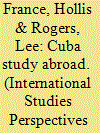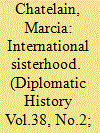| Srl | Item |
| 1 |
ID:
117728


|
|
|
|
|
| Publication |
2012.
|
| Summary/Abstract |
In an attempt to meet the goal of internationalizing the curriculum and equipping students for the twenty-first century and beyond, schools have engaged themselves in a myriad of study abroad programs. These programs, in keeping with many of these schools' missions, are intended to encircle students with a more critical global awareness. While study abroad programs are promoted as self-identity discovery tools, through which students can construct new national identities that transcend national borders, this paper, based on interviews conducted with College of Charleston students who studied in Cuba during spring 2007 and 2009 semesters, explores the relationship between the study abroad experience and identity formation. We argue that these encounters not only allow students to interrogate what it means to "be American" beyond the emotional, physical, and intellectual bounds of the United States, but also how their previous conceptions of self and nation can strengthen, not contradict, a global context.
|
|
|
|
|
|
|
|
|
|
|
|
|
|
|
|
| 2 |
ID:
132016


|
|
|
|
|
| Publication |
2014.
|
| Summary/Abstract |
After World War II, the Girl Scouts of the United States of America identified international friendship as a key component of its program. In 1957, the Girl Scouts partnered with their international counterparts, the World Association of Girl Guides, to establish Our Cabaña, an international meetinghouse in Cuernavaca, Mexico, where Girl Scouts could meet and befriend fellow members from around the globe. Soon after opening Our Cabaña, leaders noticed that some Girl Scouts repeatedly ignored rules about proper behavior in Mexico, and they feared that Scouts would alienate their Guide sisters and poorly represent the United States. This article asserts that responses to the problems at Our Cabaña demonstrate a critical shift in Girl Scouts' stance on what constituted a good girl ambassador; the organization evolved from promoting manners in intercultural settings to declaring that cultural sensitivity was necessary for girls to become global citizens.
|
|
|
|
|
|
|
|
|
|
|
|
|
|
|
|